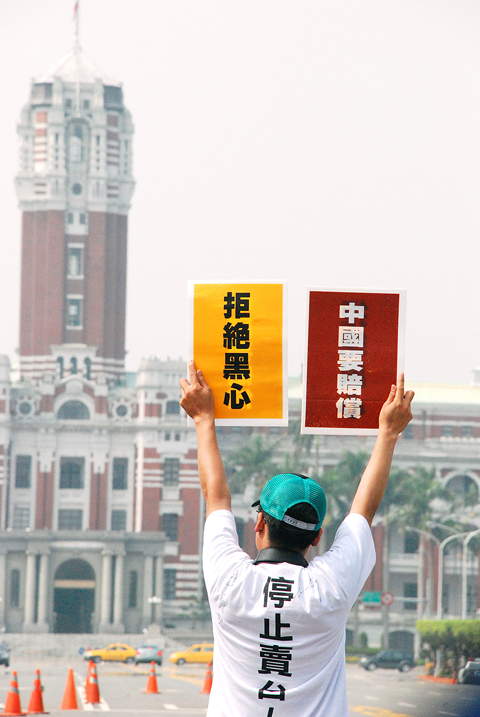The Democratic Progressive Party (DPP) said yesterday it had proposed holding rallies on Nov. 3 and Nov. 4 in Taipei City to protest against the upcoming visit of Chen Yunlin (陳雲林), chairman of China’s Association for Relations Across the Taiwan Strait.
Chen is scheduled to arrive in Taipei next Monday for a second round of cross-strait talks.
The proposed rallies would come hot on the heels of a demonstration on Saturday against Chen’s visit, a perceived lack of government action concerning imports of melamine-tainted milk and the “incompetence” of the government.

PHOTO: CNA
The DPP, which co-hosted Saturday’s rally with the Taiwan Solidarity Union and a number of pro-localization groups, said that more than 600,000 people attended the rally. The DPP said it was a success and that it would use “people power” to express its opposition to Chen’s visit and the government’s China-friendly policies.
“Saturday’s rally was a great success as it clearly expressed the five main appeals: No hollowing out sovereignty, no incompetent governance, no ‘one China’ market, no tainted products and no acceptance of Chinese academic degrees,” DPP caucus whip William Lai (賴清德) said.
The focus of the rally was not affected by former president Chen Shui-bian’s (陳水扁) participation, he said.
The DPP has been put in an awkward position in its relationship with Chen Shui-bian, who was implicated in an alleged money-laundering case.
Some members have suggested the party distance itself from him to stress party integrity and reform, while others worry that doing so would draw ire from its core supporters, most of whom are Chen Shui-bian diehards.
Dozens of people who attended Saturday’s demonstration spent the night on Ketagalan Boulevard — the site of the rally — and continued a sit-in protest yesterday, holding banners and chanting slogans.
Police watched the activity but did not make any attempts to force them to leave as the road permit obtained by the event-organizers allowed the crowd to stay until 10pm last night.
The DPP said the proposed rallies on next Monday and Tuesday would be held in front of Taipei Main Station, but that details were still being discussed.
DPP Chairwoman Tsai Ing-wen (蔡英文) said in a press statement yesterday that “the tremendous rally showed that Taiwanese identity still existed.”
Presidential Office Spokesman Wang Yu-chi (王郁琦) said on Saturday evening that President Ma Ying-jeou (馬英九) would be very happy to talk about combating violence, fighting corruption and other economic issues with Tsai.
Tsai said Ma’s response was an attempt to shift the focus away from people’s resentment of his policies.
“I regret that Ma’s first response was disappointing,” Tsai said. “We have to continue to take to the streets.”
The Chinese Nationalist Party (KMT) caucus said yesterday that the DPP failed to show its opposition to “violence” and “corruption” during Saturday’s rally.
KMT caucus deputy secretary-general Lo Shu-lei (羅淑蕾) told a press conference that cheering for Chen Shui-bian during the event showed that he had won a “victory” over the public’s “anti-corruption” movement.
ADDITIONAL REPORTING BY FLORA WANG

A Chinese freighter that allegedly snapped an undersea cable linking Taiwan proper to Penghu County is suspected of being owned by a Chinese state-run company and had docked at the ports of Kaohsiung and Keelung for three months using different names. On Tuesday last week, the Togo-flagged freighter Hong Tai 58 (宏泰58號) and its Chinese crew were detained after the Taipei-Penghu No. 3 submarine cable was severed. When the Coast Guard Administration (CGA) first attempted to detain the ship on grounds of possible sabotage, its crew said the ship’s name was Hong Tai 168, although the Automatic Identification System (AIS)

An Akizuki-class destroyer last month made the first-ever solo transit of a Japan Maritime Self-Defense Force ship through the Taiwan Strait, Japanese government officials with knowledge of the matter said yesterday. The JS Akizuki carried out a north-to-south transit through the Taiwan Strait on Feb. 5 as it sailed to the South China Sea to participate in a joint exercise with US, Australian and Philippine forces that day. The Japanese destroyer JS Sazanami in September last year made the Japan Maritime Self-Defense Force’s first-ever transit through the Taiwan Strait, but it was joined by vessels from New Zealand and Australia,

SECURITY: The purpose for giving Hong Kong and Macau residents more lenient paths to permanent residency no longer applies due to China’s policies, a source said The government is considering removing an optional path to citizenship for residents from Hong Kong and Macau, and lengthening the terms for permanent residence eligibility, a source said yesterday. In a bid to prevent the Chinese Communist Party (CCP) from infiltrating Taiwan through immigration from Hong Kong and Macau, the government could amend immigration laws for residents of the territories who currently receive preferential treatment, an official familiar with the matter speaking on condition of anonymity said. The move was part of “national security-related legislative reform,” they added. Under the amendments, arrivals from the Chinese territories would have to reside in Taiwan for

CRITICAL MOVE: TSMC’s plan to invest another US$100 billion in US chipmaking would boost Taiwan’s competitive edge in the global market, the premier said The government would ensure that the most advanced chipmaking technology stays in Taiwan while assisting Taiwan Semiconductor Manufacturing Co (TSMC, 台積電) in investing overseas, the Presidential Office said yesterday. The statement follows a joint announcement by the world’s largest contract chipmaker and US President Donald Trump on Monday that TSMC would invest an additional US$100 billion over the next four years to expand its semiconductor manufacturing operations in the US, which would include construction of three new chip fabrication plants, two advanced packaging facilities, and a research and development center. The government knew about the deal in advance and would assist, Presidential